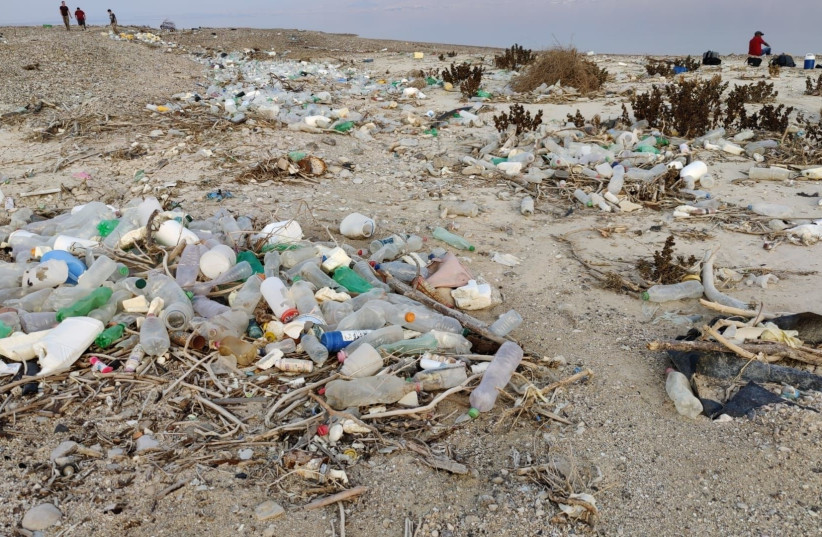ENVIRONMENTAL AFFAIRS: The environmental impact of abolishing the single-use plastic tax could have Israelis paying with their lives.
By JOANIE MARGULIES
Published: JANUARY 20, 2023

(photo credit: YONATAN SINDEL/FLASH90)
One of the first measures Finance Minister Bezalel Smotrich decreed when taking office earlier this month was to repeal the tax imposed on disposable goods that was imposed by his predecessor Avigdor Liberman. The goal was to ease the financial burden on large families, especially religiously observant ones, who rely on plastic plates and utensils for Shabbat meals.
The tax was imposed, however, for environmental concerns.
It can take up to 450 years for plastic to decompose, and environmental experts are warning that a return to high consumption of single-use utensils can mean disaster for the environment.
Most consumers are largely unaware of this. They end up polluting water sources, from rivers and streams, like the Jordan River, to larger bodies of water, like the Kinneret, the Red Sea, the Dead Sea and even the Mediterranean. Water is a scarce resource throughout the Middle East, yet nations in this arid region have not kept single-use products from infiltrating them.
“These products will not disappear. They [degrade] into microplastics, which end up in the water, animals, fish, and even end up in our food.”Nadav Tal
“These products will not disappear. They [degrade] into microplastics, which end up in the water, animals, fish, and even end up in our food,” said Nadav Tal, a water officer at EcoPeace Middle East.
Plastic garbage is seen cluttering the shores of Israel’s Dead Sea. (credit: Dr. Gur Mizrahi)
Plastic utensils degrade into microplastics, which end up in everything
EcoPeace Middle East is a nonprofit organization focused on creating shared environmental solutions for Israelis, Palestinians and Jordanians alike. Tal’s work at the organization is centered on research on environmental issues, primarily water-based.
Zalul, an Israeli environmental organization with oceans and rivers at the center of its work, had been instrumental in putting the tax in place in the first place. Data provided showed that after the tax was enacted, single-use consumption from October 2021 to September 2022 went down 32%. Zalul saw an 18% reduction of waste at beaches.
Zalul’s research found that after the tax was enacted, “people changed their consumption behavior. Ninety percent of waste at the beach is plastic, which significantly decreased,” Limor Gorelik, the organization’s plastic pollution prevention coordinator, stated.
PLASTIC AS a product came to life following an increased demand in everyday products that were initially made with tortoise shells and ivory. Since those products were dependent on wildlife, a suitable alternative needed to be fashioned in order to save those species.
So, scientists combined leftover materials from oil and acid to create plastic products. These plastic products were created with good intentions. They were not supposed to be able to break down easily, and would last consumers a long time. However, the solution ultimately became the problem. The products do not break down naturally, which ultimately became the issue that brought us to where we are today.
A cup of coffee in a cup that might appear to look like paper, but is actually made of plastic, can lead to microplastics seeping into your bloodstream through your drink, melting plastic into the beverage without so much as a taste.
Data provided by EcoPeace showed that microplastics have a greater toll on our bodies than previously thought. They can end up in your body through the chain reactions caused by waste. Studies show that microplastics have strong links to several hormonal health issues, such as a variety of endocrinologic problems. They have also been tied to cancer cases and even fertility issues in women and men alike. Overexposure to plastics can also be linked to diabetes, which can be fatal if not approached properly.
ANOTHER ISSUE presented by single-use plastics is their exposure to wildlife. Animals on land and sea and even aerial creatures can find themselves meeting an early demise when exposed to single-use products.
Plastic products pile up and trash overflows. Some folks don’t even bother to bring their empty beverage cups to trash cans just meters away, but instead leave them on the benches they were sitting on. Plastic products may sit unattended for an undetermined amount of time before a curious animal finds itself munching on it. They may choke, suffocate or experience life-ending blockages caused by these products. These animals fall victim to the overflow of trash created by single-use products.
Evelyn Anca, codirector of Plastic Free Israel, further elaborated on the impact that plastic products have on wildlife in Israel.
“The Israel Nature and Parks Authority saw the increased trash and its impact on animals. So, they conducted a series of autopsies on wild animals. Their findings were horrendous.”Evelyn Anca
“The Israel Nature and Parks Authority saw the increased trash and its impact on animals. So, they conducted a series of autopsies on wild animals. Their findings were horrendous,” she said.
After accessing these autopsies, Anca told gruesome tales of animals of all sizes being found with plastic in their systems at the time of death, as the cause of death. “We saw lots of ibexes, jackals, the endangered Palestinian mountain gazelle, which also actively eats plastic due to food scarcity, when they find it.” Autopsies of wild pigs, wolves, hedgehogs and even lots of birds revealed plastic consumption as the cause of death.
With the dismissal of the disposables tax, outdoor picnic areas will undoubtedly see an increase in single-use waste. Anca said that the effect that plastic products have on land animals is not recognized sufficiently. “The world is used to hearing about whales and turtles and plastic bags, but what about the animals on land?”
Since products don’t naturally break down, they remain in the soil indefinitely. Animals suffer the consequences.
Who is behind the plastic usage problem in the Middle East?
ACCORDING TO data provided by the World Bank, Israel is not a lone actor in the plastic usage problem in the Middle East.
“The average [Middle East and North Africa] resident contributes more than 6 kg. of plastic waste [that is channeled] into the region’s seas each year, the highest level globally. A major cause for this plastic waste is poor solid waste management and an overuse of plastics, partly due to a lack of plastic alternatives,” an annual report by the World Bank noted.
Israel’s neighbors have not fared well either. Jordan’s minimal bodies of water, such as the Dead Sea and the Jordan River, can be found with trash floating along their banks.
Plastic Free Israel provided data that showed that while Egypt has more anti-plastic action in place, it is still plagued with the same issue. According to the Egyptian Organization for Human Rights, 4.5 million tons of plastic waste flow into the Nile River annually.
According to Zalul’s Gorelik, getting rid of the tax won’t mean that consumers in Israel will just go back to buying disposable items; they’ll buy even more.
“Of course, we are worried people will go back to buying these products. But it’s not just that these people are buying these products; it’s that, with the tax abolished, they would end up purchasing even more [of them], with waste only increasing,” she said. •
https://www.jpost.com/environment-and-climate-change/article-729079

